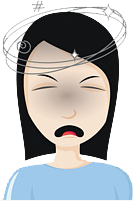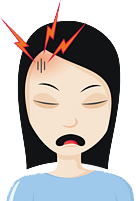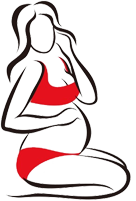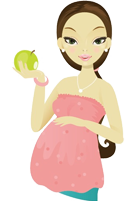Home Page › Pregnancy 101 › Pregnancy Symptoms and Remedies
Pregnancy Symptoms and Remedies
Discovering that you’re about to have a little bundle of joy is definitely one of the happiest moments in your life. However, the changes that your body will go through over the next nine months can sometimes put a damper on things. But not to worry. Here are some things you can do to overcome some of the common pregnancy symptoms, so you can focus back onto the most important thing: your baby’s arrival!
Morning sickness
Nausea is one of the most common symptoms of pregnancy. Up to 80-85% of women have been reported to experience it, particularly during the first trimester[1]! The severity of it varies greatly from one mum to the other, but it generally becomes milder as your pregnancy progresses.
If you do suffer from nausea or vomiting, try nibbling on some ginger or dry crackers, and/or avoid food with strong odour. Eat smaller, but frequent meals. In some cases, acupressure (applying pressure on a particular point on the wrist called pericardium point six) and reflexology are also said to help relieve the symptoms.


Aches and pains
To ease backaches, try to keep within a healthy weight range so that you do not put additional pressure on your back. Wear sensible shoes (no high heels!) and don’t sit or stand for too long at a time. Heating pads, gentle massages and additional back support may also help alleviate the ache.
If you experience abdominal discomfort, try taking a warm bath or enrol in a pregnancy exercise class to strengthen your abdominal muscles. Not to forget, as your breasts grow, get fitted for a new bra for added comfort and support!
Stretching skin
Try reducing stretch marks by gently massaging your tummy with coconut oil or cocoa butter every day. It not only keeps your skin smooth and soft, it also helps with the itch as your skin stretches!


Constipation and haemorrhoids
Regain healthy bowel movement by exercising regularly, drinking more water (at least 2 litres a day) and eating more good fibres found in fruits, vegetables and whole grain breads. In dealing with haemorrhoids, don’t strain when you go to the loo, and try a sitz bath (where you soak yourself in warm water) to relieve the inflammation and soreness on your bottom.
It will certainly be worth your while to find a remedy(s) that works for you. But remember, do not consume any medication unless it is advised or prescribed by your gynaecologist. Also, always check with your doctor if you are experiencing severe pains, or are worried about a persisting symptom.




